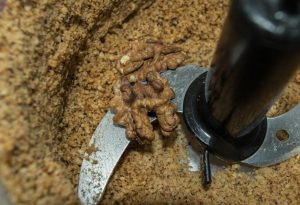In this Article
As parents start introducing their baby to solid foods, they want to include tons of other food items into his diet. However, not all solids are easily digestible by all babies as their digestive systems are weak and developing. One of the foods that parents might be tempted to introduce into their baby’s diet is the walnut. This food item is a good source of omega-3 fatty acids and is considered highly beneficial for the development of the human brain. But, you can’t begin feeding walnuts to your little one without giving certain things a thought. In this article, we shall discuss several aspects of feeding walnuts to your baby and its benefits. Read on to know more.
When Can Your Baby Eat Walnut?
You might be wondering about the right age to give walnuts to your baby. Since they have to be chewed, certain people might tell you to make walnut powder for babies and feed that. However, most doctors recommend abstaining from feeding any kind of nuts until your baby is at least a year old. Some doctors like to err on the safer side and would recommend introducing your baby to dry fruits and other nuts, only after they are at least 2 years old or so. It is always better to introduce walnuts after a few other nuts have been introduced to your baby and there hasn’t been any inadvertent reaction as such.
Nutritional Facts About Walnut
The components and their proportions in 100g of walnut are as follows:
| Component | Proportion | Component | Proportion |
| Water | 4 g | Energy | 654 kcal |
| Protein | 15.2 g | Total Lipid | 65.2 g |
| Carbohydrate | 13.7 g | Fiber | 6.7 g |
| Sugar | 2.6 g | Calcium | 98 mg |
| Iron | 2.9 mg | Magnesium | 158 mg |
| Phosphorous | 346 mg | Potassium | 441 mg |
| Sodium | 2 mg | Zinc | 3 mg |
| Vitamin C | 1.3 mg | Thiamin | 0.34 mg |
| Niacin | 1.12 mg | Folate | 98 ug |
| Vitamin A | 20 IU | Vitamin E | 0.7 mg |
| Vitamin K | 2.7 ug |
Health Benefits of Walnut for Babies
Walnuts have a bunch of nutrients that are essential for the growth and development of infants. Even black walnuts are known to have a lot of nutritional properties in them. Here is why you should consider feeding walnuts to babies. The benefits of black walnut for babies are similar.
1. Energy Food
Toddlers require a lot of energy during their growth years. Walnuts are high in calorie and help provide all the energy which your active a child needs.
2. Great Source of Minerals
Walnuts are packed with essential minerals like magnesium, potassium, folate, calcium, zinc, etc., which are much required for the optimal growth of your baby. Calcium strengthens his bones, while iron manages the levels of haemoglobin. The potassium and sodium in walnuts help balance electrolytes, and phosphorous aids digestion, cell repair, and protein generation in your child’s growing body.
3. Rich Source of Vitamins
All the vitamins in walnut, including Vitamin A, C, E, and K, directly benefit the child’s growth. These vitamins help build immunity, aid the conversion of glucose to glycogen, and stimulate metabolic activities.
4. Aids Rapid Brain Development
Walnuts contain folate as well as omega-3. Both these nutrients primarily help develop the baby’s brain. Some people say if you take a close look at a walnut, you’d find it resembles two halves of the brain, which is why it is important for brain development. The truth in this myth may be debatable, but what’s known for sure, is that it does support rapid brain development.
5. Helps Induce Deep and Healthy Sleep
Walnuts have melatonin, which helps induce sleep and regulate body functions during sleep. Sleep is extremely necessary for babies since most of the growth happens when they enter deep sleep.
6. Helps Maintain Optimal Body Weight
Nowadays, obesity in children has become a common concern. Walnuts in the correct amounts help reduce and/or maintain body weight in children. Appropriate body weight will help your child stay healthy and keep illnesses at bay.
These are some of the benefits of walnuts for babies. Among the foods that bring about complete development in infants, walnut can be considered a great addition to your baby’s diet as it not only provides energy but is also useful in maintaining bone health, body weight and immunity. However, there are certain precautions that you must bear in mind before you feed some walnuts to our little one. Let’s take a look at them.
Things to Remember Before Feeding Walnuts to Your Baby
- Age of the baby: It is wise to wait until the baby is at least a year old or even 2 years old. Nut allergies are quite common in babies, and your little one could be allergic to walnuts. If you feed him walnuts at a very early age, the allergic reactions could lead to serious health conditions. Also, sometimes, babies have an allergic reaction to certain foods in the beginning, and their bodies get used to it when they grow older. Some children, however, might continue having allergies all through their life. Therefore, always bear in mind to fees walnuts only when your baby’s immunity is stronger.
- Family History of Allergies: Allergies can trickle down from one generation to the next. If either of the parent or both have a food allergy, there is a good chance the baby has the same allergy. The genes causing the allergy might descend from the parent to the baby. In this case, it is always safe to err on the side of caution and introduce nuts only when the child is a little older.
- Paediatric Opinion: In certain cases, a paediatrician might prescribe blood tests for allergies. You may discuss this option with the paediatrician and introduce walnut only after you are 100% sure that your little one is not allergic to nuts.
After confirming that you can feed walnuts to your baby, you may begin feeding in limited quantities only because excessive consumption of walnut lead to side effects. Read on to know more.
Side Effects of Consuming Walnuts in Excess
Here are some side effects your baby could have because of excessive consumption of walnuts.
- Issues With the Digestive System – Your baby may experience bloating, loose stool, diarrhoea, and stomach ache if he eats too many walnuts at a time. The high fibre content in walnuts can lead to these issues which should be controlled to avoid dehydration in babies.
- Weight Gain – As much as walnuts can help manage body weight, this high-calorie food when consumed in excess, can lead to weight gain.
- Could Aggravate Ulcers – If your baby has ulcers, walnuts could aggravate them and cause discomfort. In case it happens, ensure your baby drinks enough fluids, especially water.
- Choking Hazard – Raw walnut must not be fed to babies who cannot chew foods on their own or could choke on their food when left unsupervised. Cut them into small pieces while giving
Precautions to Take While Feeding Walnuts to Your Baby
Here are some precautions you can take to ensure your baby doesn’t have any of the side effects mentioned above.
- Always get an allergy test. In case your baby is allergic to peanuts, there’s a thick change he will be allergic to walnuts too. Be very sure that the child can eat walnuts.
- To avoid choking hazards, you may make walnut butter or one of the recipes that do not contain pieces of walnut.
- Ensure your baby drinks enough fluids if he experiences diarrhoea or ulcers.
- Consult a doctor immediately if your baby develops any side effects.
Now let’s check out some recipes that you can make for your munchkin to introduce walnut into his diet.
Walnut Recipes for Babies
Here are some healthy and delicious walnut recipes that your little one will not resist.
1. Walnut Butter
Walnut butter can be a healthy addition to your baby’s diet. You can spread some on a toast or feed him a spoonful in between meals.
Ingredients
- 1/2 cups of shelled walnuts
- 1 to 2 teaspoon of coconut oil

How to Make
- Dry roast the walnuts in a pan till they get a slight golden colour.
- Put them in a food processor and crush them till you get a fine powder.
- Add about 1/2 teaspoon of coconut oil and blend further till you get a smooth consistency of walnut butter.
- Walnut butter is ready for your little one.
- You can store it in an airtight glass jar and refrigerate it to make it last for several weeks.
2. Banana Walnut Milkshake
Banana walnut milkshake is a good option for those babies who often resist milk. This delicious mix is sure to win your little one’s heart. Please remember, this recipe is not recommended to those babies who are lactose intolerant.
Ingredients:
- 1 peeled and chopped banana
- 1.5 cups of milk
- 1 to 2 peeled walnuts
- Some ice cubes
- 1 teaspoon honey

How to Make:
- Put all the ingredients, except the honey, into a blender. Blend till you get a thick consistency.
- Pour the mixture into a glass. Top it off with some honey.
- Feed it to your baby while it is still fresh.
Walnuts not only add a different taste to your baby’s diet but also add a different texture. When your baby is old enough to have walnuts, start with one of the recipes given above. When he grows older, you can also give him raw or roasted walnuts as snacks. Any which way, always remember that for any food item to benefit your baby’s health, you must practice moderation.
References and Resources: Webmd









